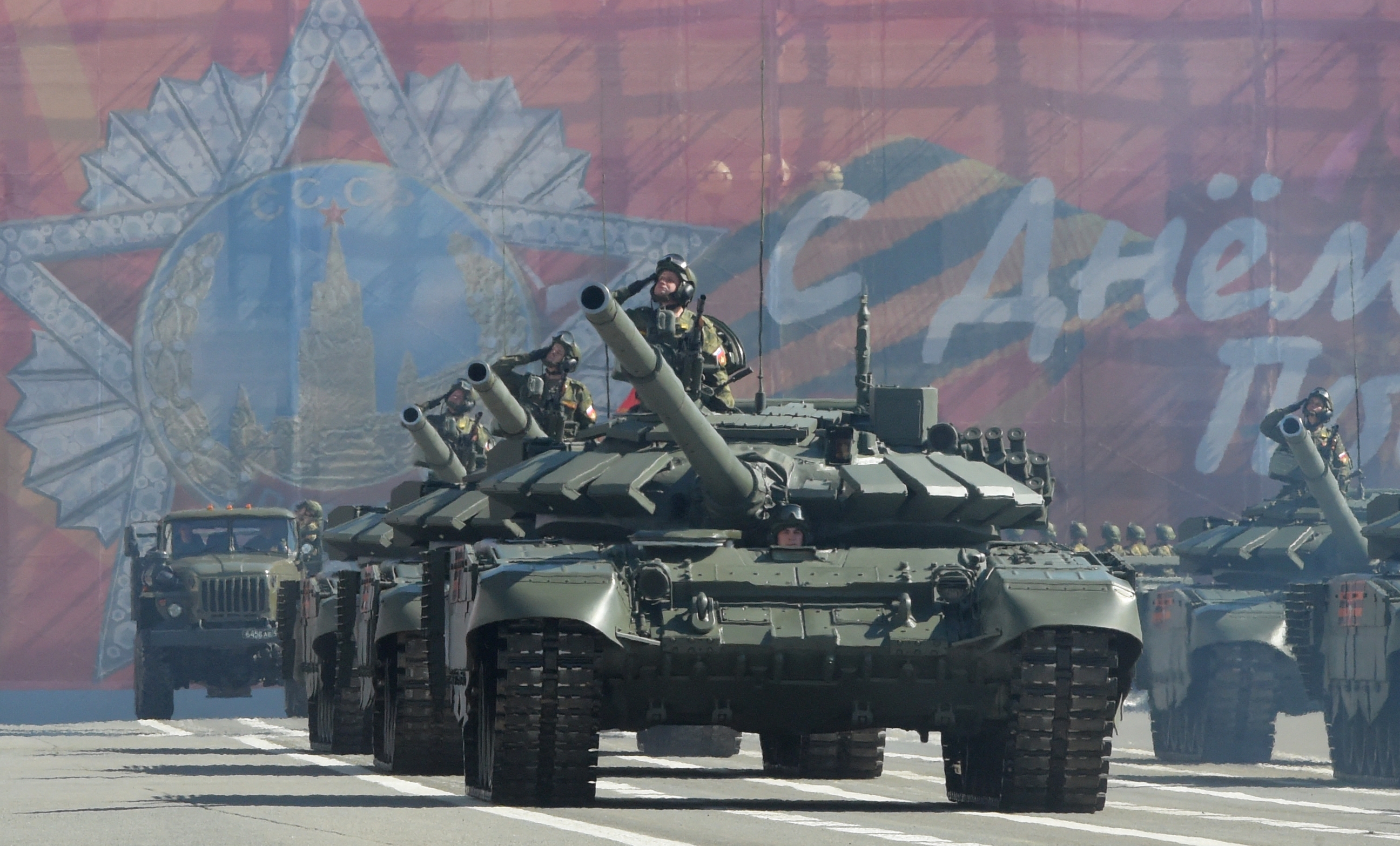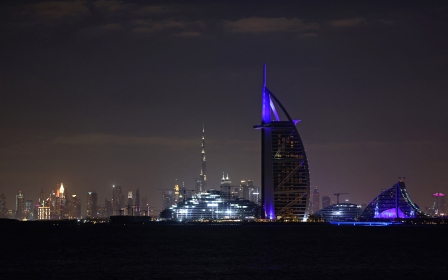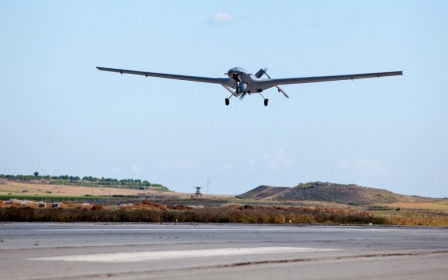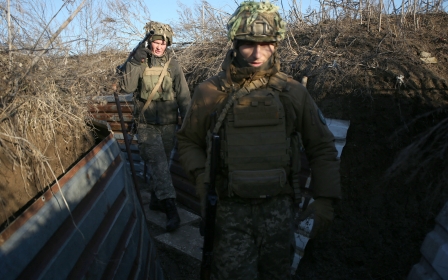Russia-Ukraine war: Moscow's quest for Middle East arms deals upended by fighting

Russia's invasion of Ukraine is upending nearly a decade of progress by the Kremlin to expand into the Middle East's lucrative arms market.
Buyers of Russian armaments face the risk of supply shortages as Russian manufacturers race to meet the needs of their country's own military, people familiar with the matter told Middle East Eye.
One senior US defence industry source, speaking with MEE on condition of anonymity, said the ability of Russian customers to source parts and components from Moscow had been "significantly constrained" since the invasion.
R. Clarke Cooper, former assistant secretary of state for political-military affairs under the Trump administration, said "they (Russia) are now in a major theatre of combat and anybody who is a customer of the Russian defence industry is being pushed to the back of the line".
'The US has put a lot of pressure on Egypt to make them stop acquiring advanced Russian arms'
- Pieter D. Wezeman, Sipri
Beyond logistical disruptions, Russia's defence industry has been pummelled by western sanctions that US officials say will make conducting business practically impossible.
Earlier this month, a senior US official told lawmakers that "it's going to be very hard for anyone to buy major weapon systems from Moscow in the coming months and years, given sweeping financial sanctions that the administration… has levelled."
"If you don't have a banking system, it's very hard for other countries to pay millions of dollars, rubles, yen or in Euros to pay for these defence systems," said Donald Lu, assistant secretary of state for South and Central Asian Affairs.
In addition to sanctions, the West has enacted devastating export controls designed to cut off the flow of semiconductors, aircraft components and other technologies that are crucial to Russia's defence industry.
"The Russian arms business has suddenly been disengaged from the entire global system. That's how sweeping this is," the defence industry source told MEE.
"We are at a point now where countries are having to reconsider their long term relationship with the Russian arms industry because of the comprehensiveness of the sanctions and export control penalties," he added.
Increasing arms sales to the Middle East had been a strategic priority for President Vladimir Putin, who sought to use Russia's defence industry to boost his country's exports and expand Moscow’s influence in the region.
Russia is the world's second-largest supplier of arms behind the United States. The majority of its exports go to India and China, but the Middle East also plays an important role.
Two states from the region, Egypt and Algeria, ranked within the top four buyers of Russian armaments globally in recent years, according to data compiled by the Stockholm International Peace Research Institute (Sipri).
In 2015, Sergei Chemezov, a close Putin ally and head of Russia's state-owned defence conglomerate Rostec, identified the Middle East as one of the country's fastest-growing markets.
"As for the conflict situation in the Middle East, I do not conceal it, and everyone understands this. The more conflicts there are, the more they (clients) buy weapons from us," he said at the time.
While official dollar figures on Russian arms sales to Middle Eastern states are murky, data compiled by Sipri showed that the share of Russian arms exported to the region nearly doubled from 11 percent in the years 2013-2017 to 20 percent between 2017-2021.
Russia's geopolitical sway in the Middle East increased after its successful 2015 intervention in Syria that saved the government of Bashar al-Assad. The Kremlin came to be seen as a reliable partner willing to deploy military muscle to help its allies and quick to cut deals with buyers looking for new weaponry.
When Washington was hesitant to supply arms to Egyptian President Abdul Fattah el-Sisi over concerns about human rights abuses, Russia stepped in and sold the country Ka-52 attack helicopters and MiG29 fighter jets.
And even as the US was committing thousands of troops to help the Iraqi government wrest back control of their country from the Islamic State group, Russia was selling Baghdad large batches of T-90 battle tanks and armoured vehicles.
Unlike the US, which has a lengthy review process for arms sales and imposes end-use monitoring to check how governments deploy weapons once they are purchased, Russian armaments come with few strings attached and are usually cheaper.
"I've never once heard a Middle Eastern defence minister say they absolutely love Russian equipment. The US is usually the preferred partner," Cooper told MEE.
"But at times, countries have a different schedule for completing a deal, different requirements, and then they may look to a country like Russia."
For countries like Egypt and Algeria, which have made large purchases of advanced equipment from Russia, the immediate concern as part of the fallout from Ukraine will be ensuring maintenance and sourcing replacement parts, defence experts say.
The engine of a MiG fighter jet may need servicing every 8 months if the aircraft is being actively used, and it is not uncommon for planes to be disassembled and flown back to Russia.
"I don't think that's going to be possible today," said Charles Forrester, a lead analyst for Janes, a defence industry publication. "This is a major challenge."
Russian house of cards
Russia's ability to woe new customers also faces fresh challenges. Reporting coming out of Ukraine is filled with images of destroyed Russian gear and the country's military has turned to soviet-era artillery barrages. There has been little promotion of cutting-edge weaponry. "It's not good for business," Forrester said.
For years, Russia has tried to break into the Middle East's richest market, the Gulf. It had some initial successes. Moscow sold thermobaric rocket launchers to Saudi Arabia and thousands of antitank missiles to the UAE.
But larger deals have been harder to come by. A $3bn memorandum of understanding (MOU) Russia signed with Saudi Arabia in 2017 for arms purchases has languished. And while the Su-75 Checkmate fighter jet was displayed with much fanfare at the Dubai air show last year, Russia has been unable to find a buyer for the plane.
Despite the Gulf states' reluctance to condemn Russia over its invasion of Ukraine, experts say they are likely to be wary of running up against US sanctions that could result from pursuing an arms deal with the Kremlin.
In 2020, the US sanctioned Turkey's defence industry under the Countering America's Adversaries Through Sanctions Act (Caatsa). The move was intended to punish the Nato ally for its purchase of the Russian S-400 missile system, but it also served as a warning to others in the region.
Egypt began slow-walking a deal to buy the Su-35 fighter jet and the Gulf monarchies quietly shelved many of their MOU’s with Russia.
"With Caatsa we made the expansion of Russia’s defence industry in the region a house of cards," Kirsten Fontenrose, a former senior director for Gulf affairs in the Trump administration’s National Security Council who is now with the Atlantic Council, told MEE.
Fontenrose said that given the tensions between the West and Russia today, any new purchase of Russian armaments by Gulf states would almost certainly draw the ire of lawmakers.
"Congress would be screaming from the rafters to impose Caatsa sanctions," she said.
'Not rewarding the US'
There are already some early signs of Russian deals withering. Last week the commander of Centcom, General Frank McKenzie, told the Senate Armed Services Committee that the US planned to approve the sale of advanced F-15 jets to Egypt.
That deal, which the general described as "a long, hard slog", is seen by some as a substitute for Egypt's stalled purchase of the Su-35 fighter jet from Moscow.
"The US has put a lot of pressure on Egypt to make them stop acquiring advanced Russian arms, and I think they will be buying a lot less in the future," Pieter D. Wezeman, a senior researcher at Sipri, told MEE.
Cooper, the former senior State Department official in the Trump administration, said the invasion of Ukraine may have provided the cash-strapped government in Cairo with the political cover needed to walk away from the Russian deal.
"It may have helped clarify things for them, and at the end of the day, Egypt really couldn't afford the Su-35.”
Besides the potential F-15 sale, experts are hesitant to predict a flurry of new arms deals between the US and Middle Eastern states as a result of the tumult within the Russian defence industry.
One reason is that Moscow's successes in the region were actually limited - constrained to a few agreements whose orders have been filled. And the US is already the main supplier of arms to countries like Saudi Arabia and the UAE. The Biden administration may also be reluctant to chase new deals.
"This administration wants to put more restrictions on arms transfers and the countries that can afford big purchases are mad at us (the US)," Fontenrose said.
That doesn't mean other exporters won't look to pick up Russia’s share of the market. Fontenrose says Gulf states could turn to Nato countries like France and the UK to make a few hefty and symbolic purchases.
"They would still have interoperability with US equipment and avoid Caatsa sanctions, all while not rewarding the US for what they see as mistreatment."
This article is available in French on Middle East Eye French edition.
Middle East Eye propose une couverture et une analyse indépendantes et incomparables du Moyen-Orient, de l’Afrique du Nord et d’autres régions du monde. Pour en savoir plus sur la reprise de ce contenu et les frais qui s’appliquent, veuillez remplir ce formulaire [en anglais]. Pour en savoir plus sur MEE, cliquez ici [en anglais].







